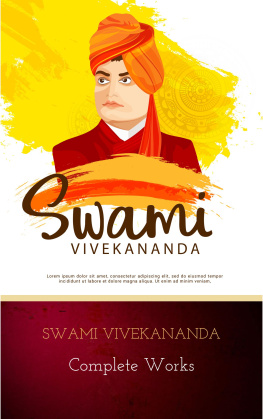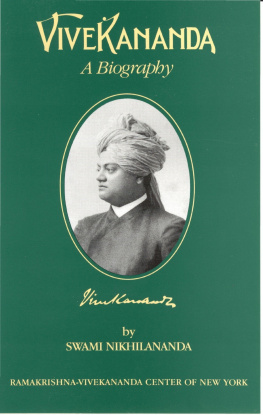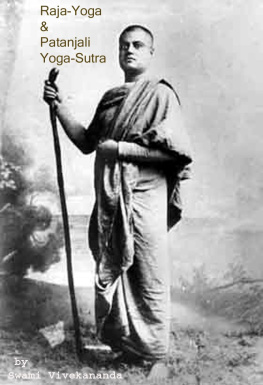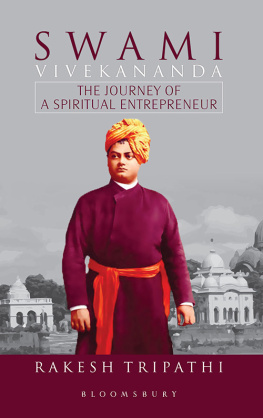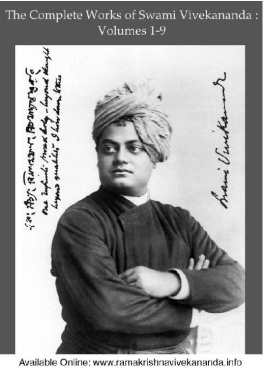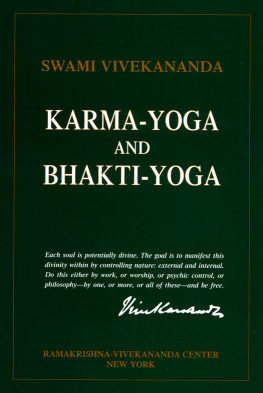Complete Works of Swami Vivekananda
Swami Vivekananda
Table of Contents
Swami Vivekananda
January 12, 1863 July 4, 1902
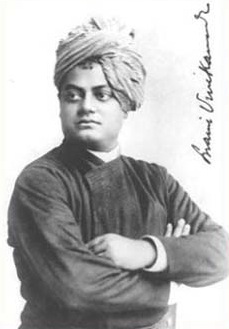
Chicago 1893
Our Master And His Message
In the four volumes ( Now in nine volumes Ed .) of the works of the Swami Vivekananda which are to compose the present edition, we have what is not only a gospel to the world at large, but also to its own children, the Charter of the Hindu Faith. What Hinduism needed, amidst the general disintegration of the modern era, was a rock where she could lie at anchor, an authoritative utterance in which she might recognise her self. And this was given to her, in these words and writings of the Swami Vivekananda.
For the first time in history, as has been said elsewhere, Hinduism itself forms here the subject of generalisation of a Hindu mind of the highest order. For ages to come the Hindu man who would verify, the Hindu mother who would teach her children, what was the faith of their ancestors will turn to the pages of these books for assurance and light. Long after the English language has disappeared from India, the gift that has here been made, through that language, to the world, will remain and bear its fruit in East and West alike. What Hinduism had needed, was the organising and consolidating of its own idea. What the world had needed was a faith that had no fear of truth. Both these are found here. Nor could any greater proof have been given of the eternal vigour of the Santana Dharma, of the fact that India is as great in the present as ever in the past, than this rise of the individual who, at the critical moment, gathers up and voices the communal consciousness.
That India should have found her own need satisfied only in carrying to the humanity outside her borders the bread of life is what might have been foreseen. Nor did it happen on this occasion for the first time. It was once before in sending out to the sister lands the message of a nation-making faith that India learnt as a whole to understand the greatness of her own thought a self-unification that gave birth to modern Hinduism itself. Never may we allow it to be forgotten that on Indian soil first was heard the command from a Teacher to His disciples: Go ye out into all the world, and preach the Gospel to every creature! It is the same thought, the same impulse of love, taking to itself a new shape, that is uttered by the lips of the Swami Vivekananda, when to a great gathering in the West he says: If one religion true, then all the others also must be true. Thus the Hindu faith is yours as much as mine. And again, in amplification of the same idea: We Hindus do not merely tolerate, we unite ourselves with every religion, praying in the mosque of the Mohammedan, worshipping before the fire of the Zoroastrian, and kneeling to the cross of the Christian. We know that all religions alike, from the lowest fetishism to the highest absolutism, are but so many attempts of the human soul to grasp and realise the Infinite. So we gather all these flowers, and, binding them together with the cord of love, make them into a wonderful bouquet of worship. To the heart of this speaker, none was foreign or alien. For him, there existed only Humanity and Truth.
Of the Swamis address before the Parliament of Religions, it may be said that when he began to speak it was of the religious ideas of the Hindus, but when he ended, Hinduism had been created. The moment was ripe with this potentiality. The vast audience that faced him represented exclusively the occidental mind, but included some development of all that in this was most distinctive. Every nation in Europe has poured in its human contribution upon America, and notably upon Chicago, where the Parliament was held. Much of the best, as well as some of the worst, of modern effort and struggle, is at all times to be met with, within the frontiers of that Western Civic Queen, whose feet are upon the shores of Lake Michigan, as she sits and broods, with the light of the North in her eyes. There is very little in the modern consciousness, very little inherited from the past of Europe, that does not hold some outpost in the city of Chicago. And while the teeming life and eager interests of that centre may seem to some of us for the present largely a chaos, yet they are undoubtedly making for the revealing of some noble and slow-wrought ideal of human unity, when the days of their ripening shall be fully accomplished.
Such was the psychological area, such the sea of mind, young, tumultuous, overflowing with its own energy and self-assurance, yet inquisitive and alert withal, which confronted Vivekananda when he rose to speak. Behind him, on the contrary, lay an ocean, calm with long ages of spiritual development. Behind him lay a world that dated itself from the Vedas, and remembered itself in the Upanishads, a world to which Buddhism was almost modern; a world that was filled with religious systems of faiths and creeds; a quiet land, steeped in the sunlight of the tropics, the dust of whose roads had been trodden by the feet of the saints for ages upon ages. Behind him, in short, lay India, with her thousands of years of national development, in which she had sounded many things, proved many things, and realised almost all, save only her own perfect unanimity, from end to end of her great expanse of time and space, as to certain fundamental and essential truths, held by all her people in common.
These, then, were the two mind-floods, two immense rivers of thought, as it were, Eastern and modern, of which the yellow-clad wanderer on the platform of the Parliament of Religions formed for a moment the point of confluence. The formulation of the common bases of Hinduism was the inevitable result of the shock of their contact, in a personality, so impersonal. For it was no experience of his own that rose to the lips of the Swami Vivekananda there. He did not even take advantage of the occasion to tell the story of his Master. Instead of either of these, it was the religious consciousness of India that spoke through him, the message of his whole people, as determined by their whole past. And as he spoke, in the youth and noonday of the West, a nation, sleeping in the shadows of the darkened half of earth, on the far side of the Pacific, waited in spirit for the words that would be borne on the dawn that was travelling towards them, to reveal to them the secret of their own greatness and strength.
Others stood beside the Swami Vivekananda, on the same platform as he, as apostles of particular creeds and churches. But it was his glory that he came to preach a religion to which each of these was, in his own words, only a travelling, a coming up, of different men, and women, through various conditions and circumstances to the same goal. He stood there, as he declared, to tell of One who had said of them all, not that one or another was true, in this or that respect, or for this or that reason, but that All these are threaded upon Me, as pearls upon a string. Wherever thou seest extraordinary holiness and extraordinary power, raising and purifying humanity, know thou that I am there. To the Hindu, says Vivekananda, Man is not travelling from error to truth, but climbing up from truth to truth, from truth that is lower to truth that is higher. This, and the teaching of Mukti the doctrine that man is to become divine by realising the divine, that religion is perfected in us only when it has led us to Him who is the one life in a universe of death, Him who is the constant basis of an ever-changing world, that One who is the only soul, of which all souls are but delusive manifestations may be taken as the two great outstanding truths which, authenticated by the longest and most complex experience in human history, India proclaimed through him to the modern world of the West.

